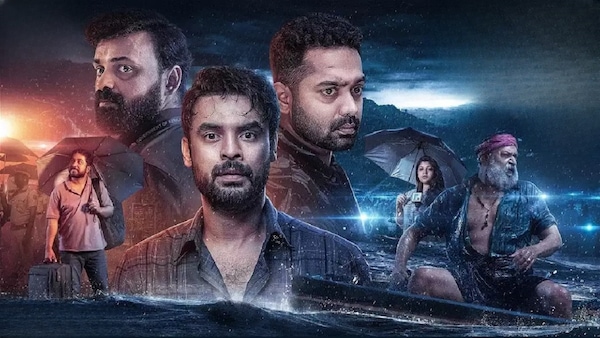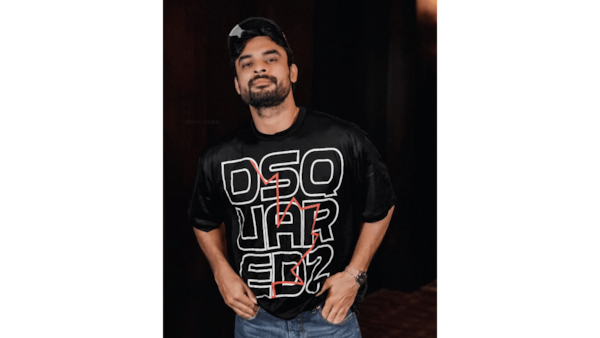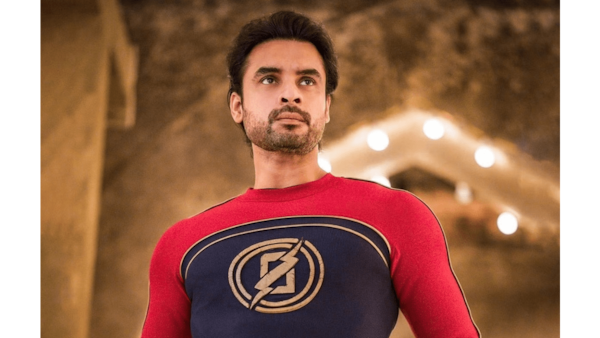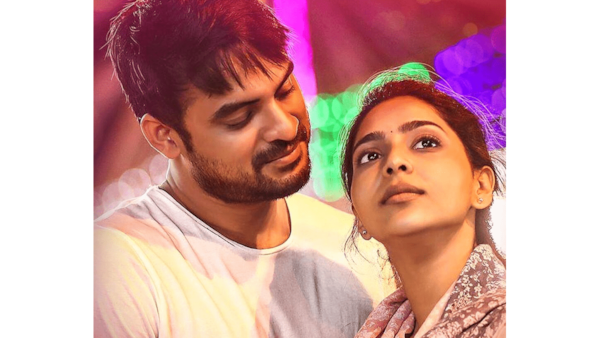The Tovino Thomas Interview | 'My Characters Are Not Perfect Or Ideal'
With his film 2018 being named India's official entry for the 2024 Oscars, Tovino Thomas chats with Subha J Rao about his journey in Malayalam cinema, and how he stays grounded amid fame.

Last Updated: 12.03 PM, Oct 15, 2023
THERE’s Tovino Thomas the actor, and there’s Tovi the person. People might or might not like a performance by the actor, but rarely will you find someone who has a problem with the person. “Oh Tovi, he always returns calls”. “Oh Tovi, he is never dismissive in his answers”. “Oh, Tovi; you’ll get a good conversation”.
And they are not lying. The actor is as real as one can get, taking a break to say hello to someone who’s walked into his home, and does not shy away from revealing his belief systems and conviction in issues concerning humankind.
He’s self-effacing to a fault. There’s a hugely popular video clip in which Tovino recalls how a fan rushed up to him, bypassing Dulquer Salmaan, and how he was just getting ready to preen when the person called him “Unni Mukundan” and hugged him. With zero malice, Tovino pretended to be Unni for the elderly fan.
During the August 2018 floods that wreaked havoc in Kerala, Tovino was among those who tried to make life as comfortable as it could be under the circumstances for others, helping carry provisions to the relief camps and more. Until a journalist discovered just who the young man — clad in shorts and tee, sporting a visored cap, carrying a bunch of nendran bananas in one hand and a carton of biscuits in the other — was!
Two years later, when Tovino the actor met with an accident on the sets and was hospitalised, there was an outpouring of care and concern for Tovino, the person his audience has come to deeply associate with and love.
Almost everyone who has crossed paths with the actor, whose 2018: Everyone Is a Hero is India’s official entry to the 96th Academy Awards, speaks of how lightly he carries his fame and success. Much too has been said about the seminal movies he is a part of. But this interview is an attempt to understand what drives Tovino the person, who in turn influences the actor in him.

In 2018, you are this person with a backstory, yet also someone who puts himself on the line for others. How did you go about playing Anoop?
I usually like to focus on my reactions. I like to design them, working with someone who knows the theory of acting. It need not be the same acting coach for every movie. I also work with someone who knows or is someone similar to the character I am to essay. If I’m playing a cop, I’ll speak to one to get the minute details and reactions right. I work with people who can help me essay a version of themselves on screen with a certain believability. Hollywood does it, so why not us? That way, every reaction is rooted in the movie’s reality. I did that for Anoop, like I did it for the other characters I’ve played and the ones I am playing now.
You’re big on technique. How do you work on it?
I like to focus on technique. I look at new movies and old classics. I read theory. I definitely watch a movie or two every day. Or, I’ll watch something on the technical aspects of cinema, which will eventually help an actor some day. I was an assistant director and I like to learn about such aspects. They help me understand a performance better and I think help me contribute better to a film.
Doing all these things makes my work easier and happier. I do a lot of homework, but it is more targeted than random. That way, I get more out of it.

While you’re a stickler for perfection, you’re also known to be very clear about your work-life balance… That’s something performers struggle with. How did you arrive at this early on in your career?
I receive a lot of love from my audience and believe that it is my responsibility to live up to that expectation. For that I need to put in 100 percent focus and effort, and I need to be happy doing that.
I have a very supportive family that understands my need to be away. I also have a very supportive work crew that understands when I tell them I need these many days off a year. Every year, in the months of April and May, when the children at home have their vacations, we take off. There are 15 of us (my parents, my siblings, and our families), and we love to travel. Earlier this year, we visited four countries.
I need to strike this balance so that I know I am keeping everyone in my life, and myself, happy. When I am with family, I am 100 percent with them. Likewise, at work, I am fully present.
If I am shooting in my hometown and get even half a day off, I go home and be with my parents and brother and family — that’s 10 of us — and come back and shoot. That rejuvenates me.
You also engage with questions, even the difficult, not-very-pleasant ones…
Yes, that’s because I believe questions make us think. Once, someone asked me what might seem like a routine question — my favourite colour. I started thinking, and it triggered pleasant memories from the past. Sometimes, all it takes is a question for us to think of ourselves. I love being asked thoughtful questions. It helps me speak my heart out.
This also spills over to social media. You were one of the very few actors who tweeted about the wrestlers’ protest.
I have no affiliation with any political party, and I can think clearly without a bias. When it is something I do not know about personally, I read up various points of view and form my own. In this case, I felt I had to write about it.
I do know that my words will be misinterpreted, and I will be attacked on social media, but that is temporary. After a week, there’s something new to capture people’s attention, and they will forget this. But, I don’t think I will forgive myself if I keep quiet.
At times, we have to step up and announce our solidarity. You can call it extreme courage or terrible foolishness. I do it because I feel I have to.
Let’s speak a little about what happened in August 2018 during the floods. Many who did not know you, were surprised to see you serve, but those who did, put it down to Tovi doing what he always does.
See, I receive unconditional love and I get only some chances to give back. I think it is basic human nature to help each other. Maybe, sometimes we are afraid to do that… maybe we had bad experiences or have been tricked. However, that should not stop us from doing what we instinctively veer towards. One wrong experience must not stop us from doing what we wish to.
In 2018, water was gushing into the house of one of my best friends from school, and he came and stayed with me for a few days. Later, a few of us friends got together to volunteer. My house was safe, but those in a three-kilometre radius were affected. I wanted to do what I could in my limited power/capacity.
With my brother and friends and their brothers, we went to Christ College, Irinjalkuda, and networked with authorities and students so we could provide supplies to 33 camps nearby. The good swimmers went out and rescued people. It was a life changing experience and it taught me the value of life.
At one stage, I knew that if the rain did not stop, my house would not be safe and my wife and kids did not know what was happening outside. But sometimes, miracles happen. The rain stopped, the flooding subsided. Many lost their lives, livelihoods, friends and pets, but as a state, Kerala overcame it.
A single person could not have done everything, but when many people came forward with heart, we managed to help those who needed it.
Have you started seeing rain differently, like many of us?
Ah, yes. The romantic appeal of rain has faded, now there’s an element of fear. When it rains continuously, I start panicking. There’s a paranoia now every year during the monsoon.
But the floods also helped forge new friendships. It changed equations, showed people what really matters.
Quite like what happened during the pandemic. I know of many people who became more disciplined after COVID. Before that we were all in a rat race. The lockdown allowed us time to sit and understand the value of life and family.
You’ve been an important part of a bunch of films — the lovely Minnal Murali; 2018, your highest grosser so far; the aching Maayanadhi... Do you think box office success will open up more avenues for say, a pan-India film?
Hmmm, I’d like to think that any film I do does not really rely much on the budget. But, for that matter, one of the biggest pan-India hits Kantara (Kannada) was made on a Rs 16-crore budget. That’s not a huge budget going by the bigger industries.
We cannot compete in terms of budget, but then content and craft are never dependent on the budget. They depend on talent, and we have learnt to use that talent and overcome the constraints. We did a Minnal Murali, right?
That said, I do not want to get onto the bandwagon of only big films. I want to do big and small films, play varied protagonists, a villain, a supporting character… I want to explore my potential to the fullest.

Why do you seek unpredictability when it comes to your career?
Because success is a trap. It can distract. You have to be very careful to stay true to what you set out to do. This is why I stay clear of my comfort zone. Yes, this might or might not result in box office success. But I consider both critical and box office validation as important.
Your films are doing well outside of the South too. Do you think the lockdown and the associated OTT surge has taken the edge off the language barrier?
Yes, we now know creations can definitely travel across the language barrier. Even with 2018, we did not initially have a wide release outside of Kerala. It got its deserved appreciation because it did well in the state, and then went on to engage audiences in other states. We dubbed it too, and I believe that moves like this encourage people to distribute our movies better, to help build a proper distribution system across the country.
And to do all this, we don’t really need a big budget. We can reach every nook and cranny with fresh content. We just need to make good movies, and have a distribution/promotion plan in place so that people will watch it and spread it through word-of-mouth.
I think this is just the beginning. I believe more movies from here will travel across India and the globe in the coming years. I think 2018 opened new doors for Malayalam cinema, globally. And, I’m delighted to be part of an industry where my contemporaries are putting in 100 percent effort into their movies. The benefit of all this will reflect in the coming years.
Your love for perfumes as part of the performance process is by now well-known..
Smells and fragrances handhold me to a particular zone. Petrichor reminds me of the first day of school, of new uniforms and freshly-bound books. People might find my fascination with smells childish, but I love the effect of the scents of flowers and fruits.
The first few days of a shoot, when I wear that perfume, it helps me associate it with certain character traits. It’s a very subconscious thing, and this works with the other preparations I have done to help me essay a role well.
I have a good collection of perfumes, and use a couple of them before finalising one. Depending on the character, I choose the fragrance — subtle, woody or fruity. For 2018, I used Guilty by Gucci.
You work with the director, yes, but what other input do you give to bring alive a character?
I have discussions with the writer and director for two or three days so I understand the character design well. It is important we are all on the same page. I believe that before we reach the location, we should all be clear about the scope of every character. This ensures there is no confusion on the set, while also allowing for improvisation.

You’ve died on screen in some films — Maayanadhi, 2018. How do you deal with the death of your character?
As an actor, it can trigger thoughts, and sometimes occupy your mind, but I look at it this way — that reaction is proof of how loved the characters were. You just know people won’t take it lightly.
Both — Boost-loving gangster Mathan (Maayanadhi) and do-gooder Anoop (2018) — were much loved. Earlier, before I became an actor, I would watch scenes like this as a part of the audience, and weep. That’s the mark of a well-made movie.
However, as an actor, when you see yourself dying on screen, you immediately travel back to the shoot, the technique you used and see it with a certain objectivity. You know the character too well, and you cannot react like how the audience does.
That said, in the case of 2018, it was surreal. I finished the shoot in July 2022 and the film released a year later. I had done a couple of movies in between and was detached from Anoop. And so, strangely, when I watched the movie, I wept. I finally looked at Anoop from the audience’s point of view. The tears flowed.
There’s a certain vulnerability that comes with being from a small town. How do you cope with it in the film industry, where optics matter?
Being vulnerable is good. We don’t have to pretend as if nothing affects us. I’ve been working here for 11 years, and I’ve grown up and learnt how to deal with my vulnerability, and more importantly how to use it on screen.
My characters are not perfect or ideal. I want to play characters that are vulnerable, flawed, so that people relate to them.
As a person, I have not changed much. I am very rooted, and have great family and friends. My best friends have been with me since kindergarten. They are my safe space.
It helps that I’ve never let the thought that I am a celebrity enter my head. When you succeed in something and become popular, you don’t change, your surroundings do — it’s just that people see you differently.
I don’t have to make an effort to be regular. I am very comfortable being myself. I’ve not let go of the vulnerability that every small-town person has, I just know how to manage it better.
I have equipped myself to cope with any insecurity I might have, and have a team that takes care of things that I don’t particularly do well — like the financial side of my creativity, or managing dates. I am content and in a creative zone because the team takes care of my food, drives me around… I just have to focus on things I love — family, friends and cinema. I don’t interfere or allow mindspace for anything I am not interested in. I talk only about creative things and choices I have to make.
Of late, I have begun learning new skills, and made discipline a part of my life. That helps too.
I’ve managed this without letting go of my vulnerability, and that ensures the audience doesn’t look at me on screen like an alien, but as one among them.
Subscribe to our newsletter for top content, delivered fast.

